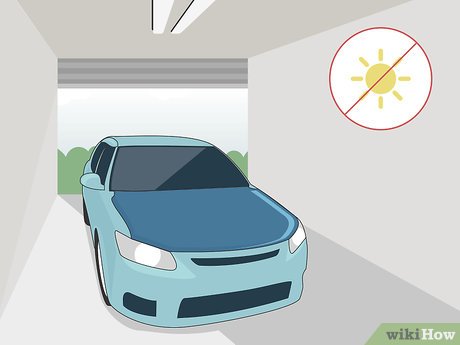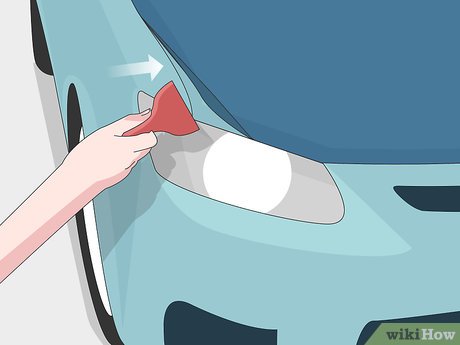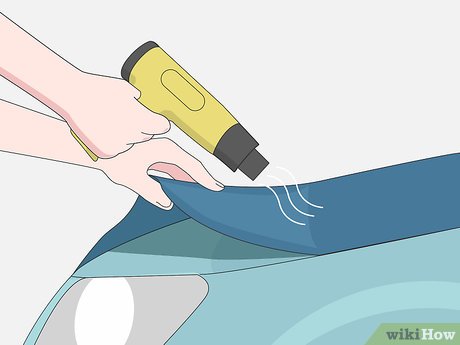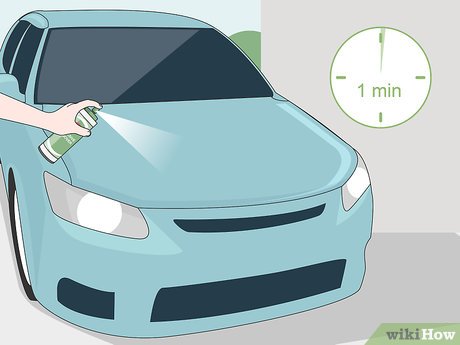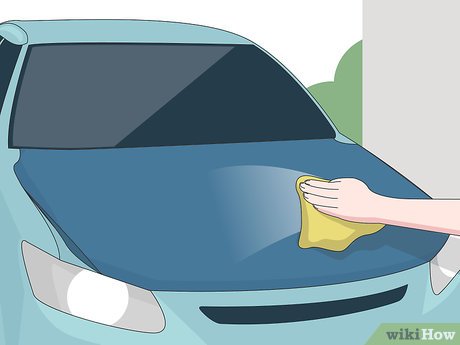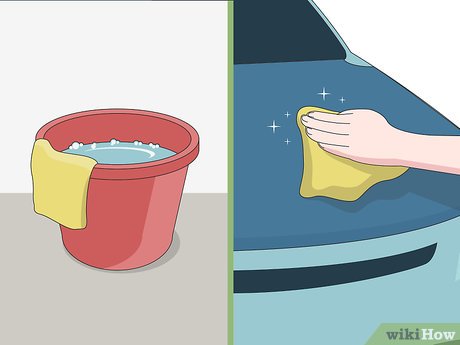How to Remove a Wrap from a Car
Part 1 of 2:
Peeling off the Wrap
-
 Work in a shaded area out of direct sunlight. Working in the sun could make the adhesive bond to your vehicle's body and makes it more difficult to remove. Work inside a garage if you can, or wait until there's an overcast day to remove your wrap.[1]
Work in a shaded area out of direct sunlight. Working in the sun could make the adhesive bond to your vehicle's body and makes it more difficult to remove. Work inside a garage if you can, or wait until there's an overcast day to remove your wrap.[1]- Avoid removing the wrap in cold temperatures since the vinyl will rip in smaller pieces and leave residue.
-
 Lift the edges of the wrap with a plastic scraper. Find the edges of your wrap along the seams in your vehicle body, such as around the doors, hood, and trunk. Try to peel the edge slightly with your fingernail to get started. If you can't lift the edge with your fingernails, slide a plastic scraper along the edge to start peeling it back.[2]
Lift the edges of the wrap with a plastic scraper. Find the edges of your wrap along the seams in your vehicle body, such as around the doors, hood, and trunk. Try to peel the edge slightly with your fingernail to get started. If you can't lift the edge with your fingernails, slide a plastic scraper along the edge to start peeling it back.[2]- You can buy plastic scrapers at vehicle detailing shops or from a hardware store.
- Don't use any metal razor blades to peel the edges or else you could damage the vehicle body underneath.
-
 Heat the wrap near the edges with a heat gun. Hold the heat gun 6 in (15 cm) away from your vehicle as you use it. Move the heat gun back and forth to distribute the heat evenly, so the adhesive sticks to the wrap instead of your vehicle. As you heat it, tug at the edge of the wrap to see if it removes easily.[3]
Heat the wrap near the edges with a heat gun. Hold the heat gun 6 in (15 cm) away from your vehicle as you use it. Move the heat gun back and forth to distribute the heat evenly, so the adhesive sticks to the wrap instead of your vehicle. As you heat it, tug at the edge of the wrap to see if it removes easily.[3]- You can buy a heat gun from any hardware store or online.
- Don't heat any areas where the vinyl is covering chrome.[4]
- Only heat the wrap enough so you can still comfortably hold it without wearing gloves.
-
 Pull the wrap off at a 15- to 20-degree angle from the vehicle. Slide both of your thumbs underneath the edge of your wrap and spread your fingers out on top of it. Lift the wrap so it's at a 15-degree angle to the vehicle's body and slowly pull up the wrap. Do your best to keep your wrap in a single piece as you remove it so it's easier to take off.[5]
Pull the wrap off at a 15- to 20-degree angle from the vehicle. Slide both of your thumbs underneath the edge of your wrap and spread your fingers out on top of it. Lift the wrap so it's at a 15-degree angle to the vehicle's body and slowly pull up the wrap. Do your best to keep your wrap in a single piece as you remove it so it's easier to take off.[5]- Avoid peeling the wrap off at a 90-degree angle since it will cause the adhesive to stick on your vehicle.
-
 Reheat the wrap if it gets difficult to remove. When the wrap cools down, the adhesive will stick to your vehicle's body again and make it more difficult to peel off. Use your heat gun near the edge you're peeling to reheat the adhesive. Heat the wrap evenly so all of the adhesive lifts as you pull off the wrap.[6]
Reheat the wrap if it gets difficult to remove. When the wrap cools down, the adhesive will stick to your vehicle's body again and make it more difficult to peel off. Use your heat gun near the edge you're peeling to reheat the adhesive. Heat the wrap evenly so all of the adhesive lifts as you pull off the wrap.[6]Tip: You can also pour water heated to 100 °F (38 °C) on the vinyl wrap just below the edge to cover an area more evenly.[7]
Part 2 of 2:
Removing Leftover Adhesive
-
 Spray a chemical adhesive remover on any residue and let it soak for 1 minute. Look for a non-abrasive chemical citrus cleaner that's meant to break apart adhesive materials. Put the adhesive remover in a spray bottle and apply it to any adhesive you find. Leave the adhesive remover on the residue for 1 minute so it has time to soak in.[8]
Spray a chemical adhesive remover on any residue and let it soak for 1 minute. Look for a non-abrasive chemical citrus cleaner that's meant to break apart adhesive materials. Put the adhesive remover in a spray bottle and apply it to any adhesive you find. Leave the adhesive remover on the residue for 1 minute so it has time to soak in.[8]- Adhesive remover can be purchased from your local hardware store.
- If you don't have a spray bottle, you can also wet a cloth with the adhesive remover and apply it to the vehicle.
-
 Wipe the adhesive away with a cleaning cloth. Use a clean rag when you're cleaning the residue off your vehicle. Work in a back and forth motion, applying firm pressure to the area to ensure you remove all of the adhesive. When you're finished, the surface should feel smooth rather than sticky to the touch.[9]
Wipe the adhesive away with a cleaning cloth. Use a clean rag when you're cleaning the residue off your vehicle. Work in a back and forth motion, applying firm pressure to the area to ensure you remove all of the adhesive. When you're finished, the surface should feel smooth rather than sticky to the touch.[9]Tip: If the cloth doesn't lift the adhesive, try scratching it off using a plastic scraper or squeegee.
-
 Clean the remover off your vehicle with soapy water or rubbing alcohol. Adhesive removers can leave a cloudy residue on your vehicle. Use a cloth soaked in soapy water or rubbing alcohol and wipe the area you just cleaned until no streaks are visible.[10]
Clean the remover off your vehicle with soapy water or rubbing alcohol. Adhesive removers can leave a cloudy residue on your vehicle. Use a cloth soaked in soapy water or rubbing alcohol and wipe the area you just cleaned until no streaks are visible.[10]- If you're cleaning the adhesive off of a window, you can also use a standard glass cleaner.
Share by
Kareem Winters
Update 24 March 2020
